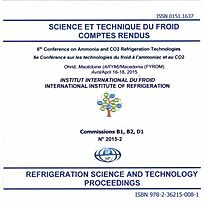
Summary
The use of waste heat of distributed cogeneration plants for thermal driven refrigeration systems can improve the annual utilization ratio significantly. This results in so called trigeneration plants. The use of thermal energy at temperatures from a minimum of 65°C to 90°C or more is a typical application for systems using water and lithium bromide solution as working fluid. With this kind of sorption refrigeration systems it is possible to provide cooling at temperatures close to but not below 0°C. Here a newly designed resorption refrigeration system based on NH3/H2O is introduced. Compared to a conventional absorption cycle with a condenser and an evaporator this resorption system consists basically of two solution absorption cycles. The new designed refrigeration system with ammonia and water as the working fluid is able to provide cooling temperatures below 0°C by using waste heat at temperatures in the range of 65°C to 90°C. An attached ice storage system is able to retain the cooling capacity. Thus allows the temporarily decoupling of the cooling demand from the generated thermal capacity. The application of plate heat exchangers together with the low pressure level of the resorption process makes it possible to design compact and cost effective plants.
Available documents
Format PDF
Pages: 8 p.
Available
Public price
20 €
Member price*
15 €
* Best rate depending on membership category (see the detailed benefits of individual and corporate memberships).
Details
- Original title: Design of a novel resorption refrigeration system with an attached ice storage system.
- Record ID : 30014593
- Languages: English
- Source: 6th Conference on Ammonia and CO2 Refrigeration Technology. Proceedings: Ohrid, North Macedonia, April 16-18, 2015.
- Publication date: 2015/04/16
Links
See other articles from the proceedings (53)
See the conference proceedings
Indexing
-
Themes:
Thermal energy storage;
Absorption and adsorption systems - Keywords: Resorption system; Ice; Design; Cooling; Ammonia-water; Energy storage; Storage; Performance
-
Comparison of a new designed resorption refrige...
- Author(s) : GRUND M., HESSE U., WEIMER T., et al.
- Date : 2015/08/16
- Languages : English
- Source: Proceedings of the 24th IIR International Congress of Refrigeration: Yokohama, Japan, August 16-22, 2015.
- Formats : PDF
View record
-
Energy storage system by using lithium-bromide ...
- Author(s) : KAZUHIKO M.
- Date : 2003/04/22
- Languages : English
- Source: Cryogenics and refrigeration. Proceedings of ICCR 2003.
View record
-
Konstruktion und Betrieb eines kleinen Eisspeic...
- Author(s) : KOLLER T., ZETZSCHE M., MÜLLER-STEINHAGEN H.
- Date : 2007/11/21
- Languages : German
- Source: DKV-Tagungsbericht 2007, Hannover.
View record
-
Extended operational flexibility of trigenerati...
- Author(s) : HILLIGWEG A.
- Date : 2013/05/09
- Languages : English
- Source: 5th Conference on Ammonia Refrigeration Technology. Proceedings: Ohrid, North Macedonia, May 9-11, 2013.
- Formats : PDF
View record
-
A performance study on a chemical energy storag...
- Author(s) : WONGSUWAN W., RUNGPIBOONSOPIT T., CHATCHAWAN C., et al.
- Date : 2004/08/01
- Languages : English
- Source: Natural Working Fluids 2004: 6th IIR-Gustav Lorentzen Conference
- Formats : PDF
View record
